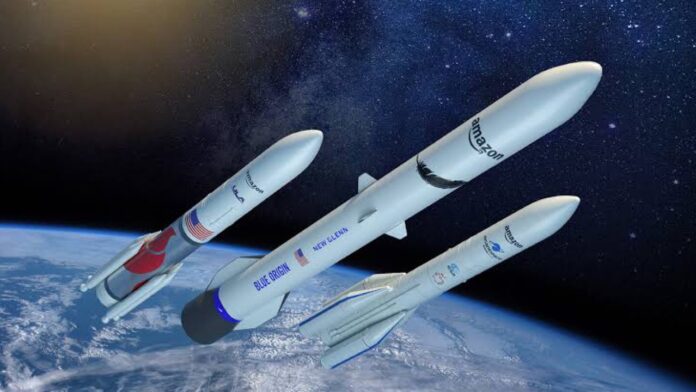The first 27 satellites for Amazon’s Kuiper broadband internet constellation were launched into space from Florida on Monday, kicking off the long-delayed deployment of an internet-from-space network that will rival SpaceX’s Starlink.
The satellites are the first of 3,236 that Amazon plans to send into low-Earth orbit for Project Kuiper, a $10 billion effort unveiled in 2019 to beam broadband internet globally for consumers, businesses and governments – customers that SpaceX has courted for years with its powerful Starlink business.
Sitting atop an Atlas V rocket from Boeing and Lockheed Martin joint-venture United Launch Alliance, the batch of 27 satellites was lifted into space at 7 p.m. EDT pm from the rocket company’s launch pad at the Cape Canaveral Space Force Station. Bad weather scrubbed an initial launch attempt on April 9.
According to Reuters, Kuiper is arguably Amazon’s biggest bet under way, pitting it against Starlink as well as global telecommunications providers like AT&T and T-Mobile. The company has positioned the service as a boon to rural areas where connectivity is sparse or nonexistent.
The mission to deploy the first operational satellites has been delayed more than a year. Amazon once hoped it could launch the inaugural batch in early 2024. The company faces a deadline set by the U.S. Federal Communications Commission to deploy half its constellation, 1,618 satellites, by mid-2026, but its slower start means Amazon is likely to seek an extension, analysts say.
Hours or possibly days after the launch, Amazon is expected to publicly confirm initial contact with all of the satellites from its mission operations centre in Redmond, Washington. If all goes as planned, the company said it expects to “begin delivering service to customers later this year.”
ULA could launch up to five more Kuiper missions this year, ULA CEO Tory Bruno told Reuters in an interview this month. Amazon said in a 2020 FCC filing that it could begin service in some northern and southern regions at 578 satellites, with coverage expanding toward Earth’s equator as the company launches more satellites.
The Web services and e-commerce giant’s Project Kuiper is an ambitious foray into space, with a late start in a market dominated by SpaceX. But Amazon executives see the company’s deep consumer product experience and established cloud computing business that Kuiper will connect with as an edge over Starlink.
Amazon launched two prototype satellites in 2023 in tests it said were successful, before de-orbiting them in 2024. It had been relatively quiet about the programme’s development until announcing its first Kuiper launch plans earlier this month.



